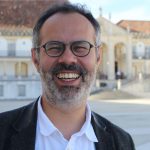The human in the Anthropocene is a geological force. Put differently, in the epoch of the Anthropocene the human is folded into Nature: possessing now a planetary scale impact equivalent to a massive meteorite, super volcanoes or huge tectonic shifts. That is, through unchecked carbon emissions leading to catastrophic global warming, we, as a species, are potentially poised to effect a sixth planetary extinction. Environmental history, on the other hand, presumed a biological human, who was constantly abrading against geography and ecological limits. Environmental history, however, interpreted and informed human agency and will. It carried lessons for sustainability and assembled ideologies for hope. In contrast, Nature is blind and if the human in the Anthropocene merges with geological time, who or what possesses the agency to save planetary life?
For more info, visit Serralves website.

Rohan D’SOUZA is Professor at the Graduate School of Asian and African Area Studies (Kyoto University). He was elected General Secretary of the Jawaharlal Nehru University Student’s Union (1989-90) on the political platform of the All India Student’s Federation. He is the author of Drowned and Dammed: Colonial Capitalism and Flood control in Eastern India (Oxford University Press, 2006), and he coordinated several edited volumes including: The British Empire and the Natural World: Environmental Encounters in South Asia (2011); and Commonwealth Forestry and Environmental History: Empire Forests and Colonial Environments in Africa, the Caribbean, South Asia and New Zealand (2020).

Gonçalo D. SANTOS is an anthropologist and a leading international scholar in the field of China studies. His research explores new approaches to questions of modernity, subjectivity, and social, technological, and ecological transformation in contemporary China. He is an assistant professor of socio-cultural anthropology in the Department of Life Sciences and a Researcher and Group Coordinator in the Research Center for Anthropology and Health (CIAS) at the University of Coimbra. Prior to joining the University of Coimbra in 2020, he held positions at the London School of Economics, the Max Planck Institute for Social Anthropology, and the University of Hong Kong. He is the author of Chinese Village Life Today (University of Washington Press, 2021) and the co-editor of Transforming Patriarchy (University of Washington Press, 2017). His research has been published in leading scientific journals in the fields of anthropology, science and technology studies, and Asian studies. He is a member of the Research Group on Culture and Society, Initiative for U.S.-China Dialogue on Global Issues, at Georgetown University, and is the founder and the director of Sci-Tech Asia, a transnational research network that focuses on the relations between technoscience, politics, and society in Asia and around the world. He is interested in comparative approaches that draw on Chinese and Asian perspectives and histories to challenge the hegemonic power of Euro-American epistemologies and narratives of modernity.
